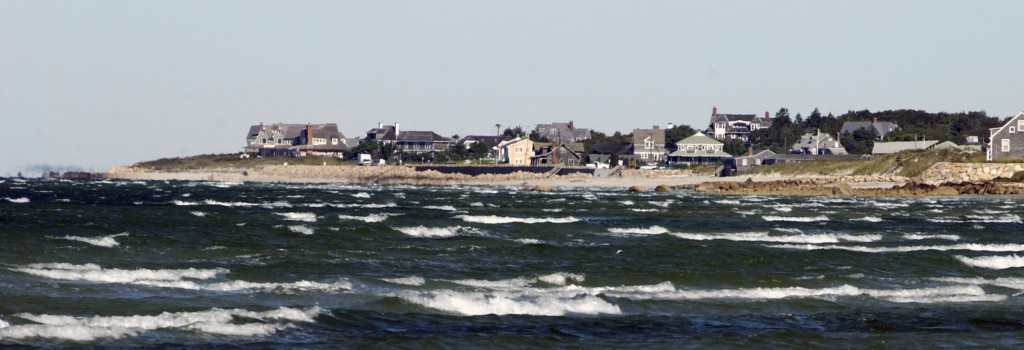Resilient Communities and Economies
2024-2025 Projects
- Di Jin and Michael Weir of Woods Hole Oceanographic Institution: To Insure or Not to Insure: How homeowners perceive flood risk
2022- 2024 Projects
» Robert Chen, University of Massachusetts Boston; Lois Hetland, Massachusetts College of Design: Cedric Woods, Institute for New England Native American Studies: Traditional Ecological Art & Science: Designing sustainable shorelines
2020-2022 Projects
- Steve Elgar and Britt Raubenheimer, Woods Hole Oceanographic Institution: Shoreline Resilience and Inlet Management
2018-2020 Projects
- Steve Elgar and Britt Raubenheimer, Woods Hole Oceanographic Institution: Shoreline resilience
- Joel Llopiz and Rubao Ji, Woods Hole Oceanographic Institution, Martha Hauff, Stonehill College, and Hannes Baumann, University of Connecticut: Source-sink dynamics and habitat modeling of northern sand lance on Stellwagen Bank and Nantucket Shoals
- Di Jin, Porter Hoagland, and Hauke Kite-Powell, Woods Hole Oceanographic Institution: Valuation of ecosystem benefits of living shorelines
2016-2018 Projects
- Jeff Donnelly, Woods Hole Oceanographic Institution: Inverse modeling of prehistoric storm intensity based on grain size characteristics of hurricane-induced event
- Steve Elgar and Britt Raubenheimer, Woods Hole Oceanographic Institution:Modeling shoreline morphological evolution
2014-2016 Projects
- Serena Moseman-Valtierra, University of Rhode Island, Jim Tang, Marine Biological Laboratory, and Kevin D. Kroeger, US Geological Survey: Shifts in greenhouse gas emissions and productivity of coastal wetlands in response to anthropogenic N loading and rising sea level.
- Steve Elgar and Britt Raubenheimer, Woods Hole Oceanographic Institution:Modeling shoreline morphological evolution
- Robert Johnston, Clark University, K. Moeltner, C. Blinn, Virginia Tech, and C. Feurt, Wells National Estuarine Research Reserve:Coastal hazards and northeast housing values: Comparative implications for climate change adaptation and community resilience (NESGC Regional Project)
- Porter Hoagland, Di Jin, Hauke Kite-Powell, Woods Hole Oceanographic Institution, and John Duff, University of Massachusetts-Boston: Buy out or build back? A comparative assessment of approaches to employing public funding to vulnerable coastal properties in the Northeastern United States (NESGC Regional Project)
- Jonathan Grabowski and M. Ruth, Northeastern University:Social and ecological factors influencing shoreline hardening in the Northeast (NSI Social Sciences and NESGC Regional Project)
2012-2014 Projects
- Porter Hoagland and Di Jin, Woods Hole Oceanographic Institution: Decision-Support for the Economic Analysis of Trade-offs in Coastal and Marine Spatial Planning (CMSP) for the US Northeast Region (Regional Socioeconomic Project from the Northeast Sea Grant Consortium Competition)
Focus Area Summary
Coastal communities in the U.S. provide a wide range of economic, social, and recreational opportunities. Over one third of the population of Massachusetts lives along the coastline. At the same time, coastal ponds, embayments, open coasts, and coastal resources may be impacted by society’s commercial, recreational and residential activities. Threats to coastal communities include sea-level rise and climate change,shoreline erosion, conflicts between the protection of waterfront property and the preservation of the beneficial functions of coastal landforms and resources, conflicts between private ownership of the coast and public access, and recreational demands on the coast through boating, fishing, shellfishing, and the use of beaches for swimming and sunbathing. Emerging interests in coastal wind farms present new opportunities to gather information on scientific, social and economic concerns of wind farm siting and development. Woods Hole Sea Grant’s portfolio in this theme includes both research and extension activities that directly interface with the management community charged with making regulatory decisions. Program elements include characterization of coastal processes, assessing sound in coastal waters before installation of coastal wind turbines, and developing new approaches for managing marine spatial planning and ocean zoning.

